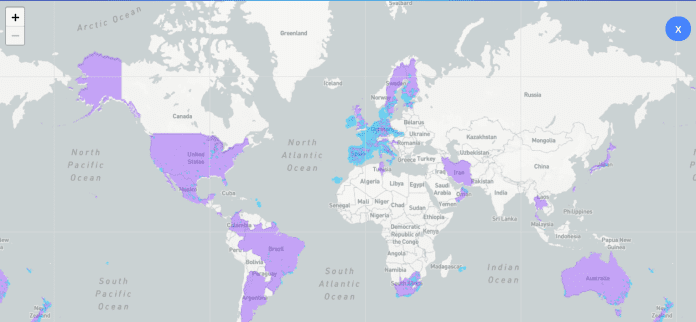Sigfox, a French company which specializes in the provision of internet of things (IoT) connectivity, has been actively expanding its global footprint over the last few years.
According to the firm’s latest figures, Sigfox currently has commercial presence in 36 markets compared to 12 last year. Sigfox also said that a total of 60 countries will have access to its IoT connectivity services by the end of next year.
The French company said 100 million euros ($117 million) have been invested by Sigfox operators to offer access to the Sigfox IoT services.
Also, a total of 17 countries currently have nationwide coverage through the firm’s IoT network. The countries where the Sigfox’s IoT network currently offers full coverage include Belgium, Czech Republic, Denmark, France, Italy, Ireland, Luxemburg, Malta, Mauritius, New Zealand, Oman, Portugal, Singapore, Slovakia, Spain, Taiwan and the Netherlands.
The French connectivity firm also said that Sigfox’s global network currently reaches 660 million people compared to 165 million last year.
At Sigfox World IoT Expo, which took place this week in Prague, Czech Republic, the company unveiled a suite of new services for the provision of IoT connectivity with an emphasis on low-cost components to support manufacturing and supply chain operations.
Among the new offerings is Admiral Ivory, which is a simplified connectivity service which makes it possible to transform any short-range wireless device into a long-range IoT device based on a hardware component that costs of 20-cents.
Sigfox said Admiral Ivory opens the door to creating connected, disposable assets and one-time IoT applications. Through Admiral Ivory, it will be possible to connect and track small parcels and letters, which offers a significant opportunity for industrial packing, logistics and retail industries.
This complements Sigfox’s low-cost connectivity solution, now named Sigfox Admiral Blue. The technology enables inexpensive modules from as little as $2 to send packets of information over long distances, while using very little power, the company said.
Sigfox also announced a new offering for manufacturers looking to use devices globally. The new product, dubbed Sigfox Monarch, is a cognitive service that support connectivity worldwide by allowing IoT devices to recognize and automatically adapt to local communications standards.
Sigfox’s technology operates in unlicensed bands worldwide, with radio frequencies ranging from 862 MHz to 928 MHz. Using unlicensed bands enables devices to send their data to the cloud while using little power, at very low cost. Sigfox Monarch provides a radio recognition service enabling devices to manage the radio frequency changes, without any additional hardware such as GPS or Wi-Fi chipset.
Sigfox also said that this new offering is tailored for logistics, freight, and consumer goods industries.
These new services add an extra layer of functionality to the existing Sigfox geolocation service. Atlas, previously known as Sigfox Geolocation, is an integrated geolocation function, which uses radio-signal analysis to determine the device’s location. Unlike GPS, the service does not increase power consumption and requires no extra hardware, beyond the already-integrated Sigfox chip.
The Sigfox network covers more than 60,000 square miles in the U.S., resulting in coverage of more than 20% of the population. The network is deployed in 19 regions, including major metros such as San Francisco, Chicago, Atlanta, New York City, Los Angeles, and Las Vegas.
Last month, Sigfox opened its third U.S. office in Dallas, Texas. The French company has initially launched operations in the U.S. in 2015, with the opening of its headquarters in Boston, along with a satellite office in San Francisco.

